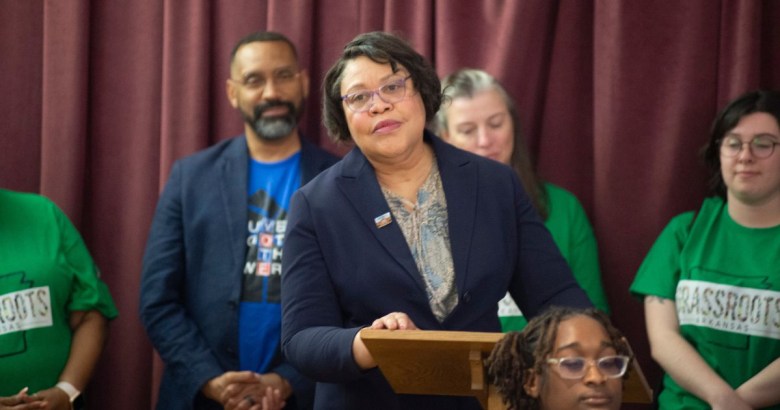
A federal judge in Little Rock heard arguments Tuesday in a lawsuit seeking to block enforcement of an Arkansas law aimed at prohibiting “indoctrination” and the teaching of “critical race theory” in Arkansas classrooms, but he did not issue a ruling.
The lawsuit, filed in March by civil rights attorneys representing Little Rock Central High students, their parents, and a history teacher, argues that Section 16 of the Arkansas LEARNS Act is unconstitutionally vague and violates the First and Fourteenth Amendments of the U.S. Constitution. Passed last year, the LEARNS Act is a sweeping overhaul of the state’s education system and a centerpiece of Gov. Sarah Huckabee Sanders’ policy agenda.
Section 16 of LEARNS was cited by the Arkansas Department of Education last summer in its decision to no longer count a pilot AP African American Studies class toward state graduation requirements. But in an affidavit included in court filings last week, Secretary of Education Jacob Oliva said AP African American studies is now listed in the education department’s course catalog for the upcoming 2024-25 school year.
The Arkansas State Conference of the NAACP and a second Central High teacher later joined the suit as additional plaintiffs. The complaint names Sanders, Oliva and members of the State Board of Education as defendants.
It is unclear when U.S. District Judge Lee P. Rudofsky will decide on the plaintiffs’ motion for a preliminary injunction.
He presided over a nearly three-hour long hearing Tuesday afternoon reminiscent of an academic treatise on free speech, education policy, critical race theory, civil rights, pedagogy versus ideology and partisan politics. There were debates ranging from the definition of “indoctrination” to the meaning of the verb “compel.”
“Ordinarily, states have wide discretion in governing curriculum in K-12 schools,” Maya Brodziak, an plaintiffs’ attorney from the Lawyers Committee for Civil Rights Under Law, said. “But that discretion is not without limits.”
Brodziak said Section 16 of LEARNS “was written in such a vague, reckless way that even the [Arkansas] Secretary of Education cannot figure out what it means and how it has to be enforced.”
Teachers “are wondering whether the point of the law is just to intimidate them into silence on topics the state doesn’t agree with,” Brodziak said. “Somewhat ironically, Section 16 is aptly named ‘indoctrination’ as it creates a pathway for the state to impose its own preferred ideas and information and exclude those who disagree.”
Rudofsky pressed the plaintiff’s lawyers on how Section 16 of the law would negatively impact teachers, pointing to language in Section 16 that indicates it applies only to “the Department of Education, its employees, contractors, guest speakers, and lecturers.”
“I do agree with you that it takes work to understand this statute,” Rudofsky said.
They responded that it already is having a chilling effect in classrooms, citing examples of Central High School teachers who have axed some coursework related to mass incarceration.
The judge also questioned Brodziak as to whether it “matters how the secretary of education and the governor describe” Section 16. In a recent court filing, the plaintiffs highlight how Gov. Sanders characterized the AP African American Studies exam as “propaganda leftist agenda, teaching our kids to hate America and hate one another.”
“Would your case be at all different if the governor and Secretary Oliva had not said anything?” Rudofsky asked. Politicians often make claims to appeal to constituents, he said, and sometimes those claims are inaccurate.
Rudofsky asked attorneys with Arkansas Attorney General Tim Griffin’s office, which is representing the state, to clarify “the absolute broadest circumstances” to which the LEARNS Act’s prohibition on indoctrination might apply.
Rudofsky pressed Solicitor General Nicholas Bronni to clarify that a teacher could not face negative repercussions for simply presenting ideas to a class.
“What I am worried about is the final portion of the statute, which seems to say that prohibited indoctrination, whatever it is, includes ‘critical race theory,’ whether or not critical race theory compels anybody to do anything or profess an idea or anything,” Rudofsky said. “It strikes me that that suggests critical race theory is automatically prohibited indoctrination.”
Bronni said that the term, “at least in the offered provisions of the statute, [is] used only in the context of something that would be prohibited indoctrination.”
“But tell me if I am wrong — none of us think critical race theory, in and of itself, compels somebody to profess or adopt or affirm [an] idea,” Rudofsky said. “So I guess I am stuck.”
“I think critical race theory can be indoctrination, just like any number of things can be indoctrination,” Bronni said. “There are iterations of it, such that if you profess this particular belief, it wouldn’t [be] indoctrination.”
At one point, Rudofsky asserted that a teacher would only be breaking the law if it could be proven that he or she forced indoctrination upon a student by punishing the student, such as through issuing a bad grade if the student did not abide by the indoctrination in question. The state attorneys agreed with the judge.
Rudofsky, who served as Arkanasas’s solicitor general under former Attorney General Leslie Rutledge, was appointed to the federal bench by President Donald Trump in 2019.
